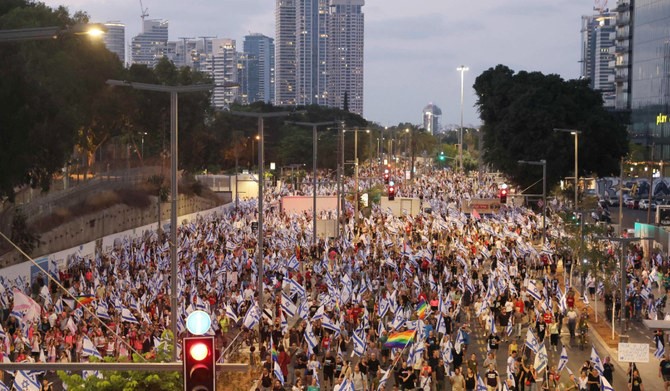TEL AVIV – Thousands of Israelis flocked to the streets on Saturday to protest the government’s decision to push through with its judicial reform package despite popular opposition.
Demonstrators holding Israeli flags marched in Tel Aviv, the country’s commercial powerhouse, continuing months of protests against Prime Minister Benjamin Netanyahu’s demands.
“We still love this country, and we’re trying to fix all of the problems,” stated film composer Itay Amram.
“We’re not accepting any of it,” the 27-year-old said to AFP, referring to the government’s “constitutional revolution.”
Protest organisers staged events around the country, from Haifa in the north to Eilat on the Red Sea, in the biggest test of public sentiment since the government submitted a key plank of its changes to a final vote in parliament on Monday.
The vote to repeal the “reasonableness” statute, which allows the Supreme Court to reject government decisions such as ministerial nominations, sparked anxiety among Israel’s main allies, notably the United States.
Israeli medics responded with a brief walkout, while scores of military veterans have pledged to stop volunteering and labour unions are considering future strikes.
Netanyahu claims the reform package is needed to equalise the relationship between elected leaders and the judiciary, but his critics accuse him of a power grab.
“We refuse to serve a dictatorship,” a banner carried by a demonstrator in Tel Aviv said.
While no official turnout figures were available, Israel’s Channel 13 indicated that around 170,000 people attended the rally in the city.
Lotem Pinchover, wrapped in an Israeli flag near the prime minister’s home in Jerusalem, said she felt “heartbroken, helpless” following Monday’s vote.
“I’m very scared of what’s going on in Israel right now, and I’m very concerned about my daughter’s future,” the 40-year-old academic added.
Months of protests, including some in support of the government, since the judicial package was presented in January have raised concerns about deepening schisms within Israeli society.
Pnina Manes, a therapist stationed at a “psychological first aid” stand for demonstrators in Jerusalem, said the scenario “tears families apart.”
“It’s started to feel like — and this is very sad for me to say — two different groups” in Israeli culture, the 59-year-old added.
Several applications have been filed at the Supreme Court this week challenging Monday’s vote, with hearings scheduled for September.
The broader reform package aims to give the government more involvement in appointing judges, as well as to downgrade the status of legal advisers linked to ministers.
The legislative process is now on pause owing to the summer holiday of parliament, with Netanyahu promising openness in negotiations over next steps.
After prior talks failed down, opposition leaders remain sceptical of talks with the government, a coalition that includes far-right and ultra-Orthodox Jewish parties.
Source: AFP


